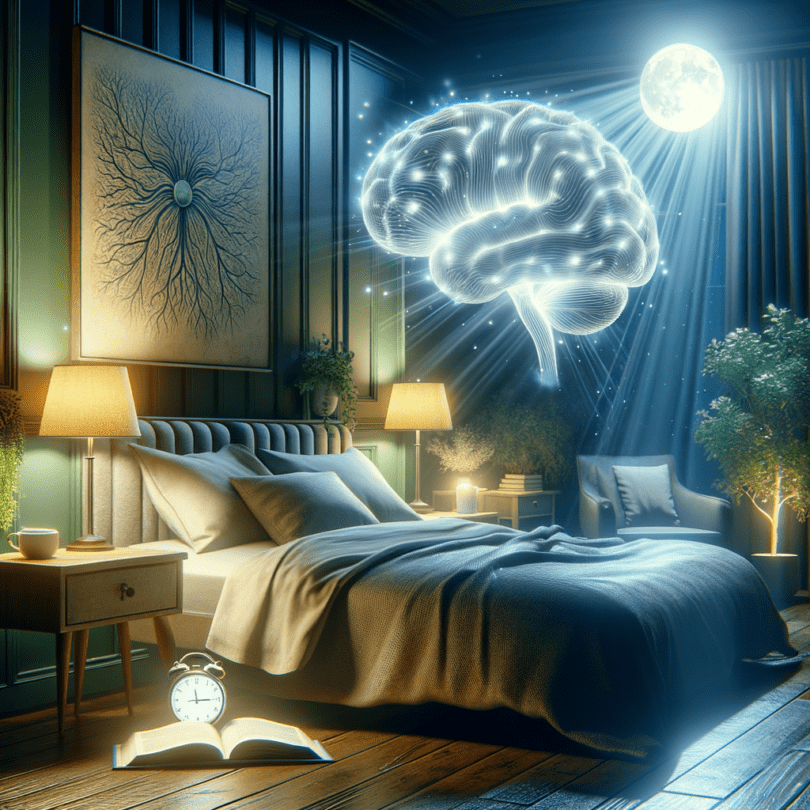You ever have one of those nights where you’re tossing and turning, and the sun rises before you’ve had a decent wink of shut-eye? Yeah, been there, done that. You wake up, glance at your to-do list, and suddenly it looks like it’s written in an alien language. Oh, and don’t even get me started on trying to recall your own phone number – it might as well be advanced calculus. Sleep, or the severe lack of it, can really scramble the ol’ noodle, can’t it? It makes you ponder, what does sleep really do for our brains? Especially in the realms of memory and mental wellbeing?
It wasn’t too long ago, during a particularly soul-sapping night, that I fell down the rabbit hole of all things sleep-related. The things I uncovered were fascinating; the kind of stuff that keeps you up at night with wide-eyed awe—which is ironic, right? Sleep isn’t just about giving our bodies a breather. Nope, our brains are busy little bees, doing what they do best: making sense of life as we know it.
Memory’s Not-So-Silent Partner: Sleep
When it comes to memory, sleep is like that unsung hero friend who’s been there for you all along, but you never noticed. It works quietly in the night, sorting through your daily dramas while you blissfully doze. It’s like your brain’s very own filing clerk, organizing and storing all those tidbits you’ll need later.
I stumbled upon this nugget of wisdom—trust me, it seemed legit—that during sleep, our brains transform short-term memories into long-term ones. So those French phrases? That grand strategy from a whirlwind Zoom call? Their fate depends a lot on how much quality sleep you clock in.
Have you tried recalling something important when your sleep is all out of whack? It’s like hunting for a needle in a haystack while blindfolded. Get decent sleep, and it’s like someone turned on the lights, and voila, there’s your memory needle, plain as day.
Sleep’s Magic on Mental Health
And then there’s mental health – quite the sensitive subject, isn’t it? It’s all about that part of your brain that decides if the day is gonna be empowering or the kind where you pull the covers over your head. Your trusty pal Sleep? It plays a pretty starring role here.
Think of your brain as a bustling city, and sleep as the cleaner that comes through at night. It tidies things up, un-clutters your mind, and sweeps away the day’s pile-up of thoughts and worries. Poetic, don’t you think? Getting enough shut-eye helps maintain our mental highways, regulating little chemicals like serotonin, which helpfully keeps our moods in check.
Chronic lack of sleep, oh dear, it’s no joke. It cranks up the irritability – or should I say, ‘grumpitude’ – a term I might have just coined. It makes dealing with stress feel like trying to spin plates on sticks. Stack up enough sleep debt, and you could be staring down anxiety, depression, and other heavy mood issues.
I learned this the hard way during those frantic college days. Chasing deadlines while chasing dragons (thanks, Game of Thrones) didn’t do wonders for my stress levels. Each sleepless night? I paid the price, emotionally and mentally.
Why We Ignore Sleep
Despite all that, why do we still kick sleep to the curb? Why do we treat it like the crust of the pizza at a feast fit for a king? Overdue projects, show binges, perhaps a wild night out, or the endless scroll through social media. Let’s be real, who hasn’t sidelined sleep before?
Peer into my life, and you’ll find I’m not immune to the pull of a binge-worthy series. Yet, when the clock strikes a number that’s past decency and my finger hovers over ‘next episode’, there’s this voice (the wise version of me) that tells me in no uncertain terms about the cost of lost sleep.
And let’s not forget how society seems to wear ‘being busy’ as a medal of honor. We might even brag about how little sleep we get, as if it’s the ultimate status symbol.
How to Befriend Sleep Again
But here’s the kicker – and take this as a gentle nudge more than a sermon – finding a balance is crucial. Wouldn’t it be something if we could make sleep a real priority? Personally, my nighttime ritual involves dimming the lights, banishing screens, and indulging in some mellow tunes. Doesn’t sound revolutionary, but it’s about signaling to my brain that it’s time to unwind.
Developing a bedtime habit is like training a puppy. Brains, despite being these complex magnificent contraptions, thrive on routine. Going to bed and waking up at consistent times can work wonders. And trust me, I’m not claiming perfection here, but I have felt the benefits.
Remember, good sleep doesn’t just fall from the sky; it needs a little love, just like any relationship worth its salt. Taking care of yourself includes pampering those tired peepers and giving in to the nightly call of dreams.
Final Thoughts
So here I am, laying it all out, like a heartfelt letter to you and to the versions of ourselves desperate for more Z’s. We owe it to ourselves to honor sleep—the timeless, yet underappreciated friend—for nurturing memory and shielding our mental health. Next time you’re tempted to cut another hour from your snooze time, take a stand, let sleep know you value it, and watch life greet you with renewed vibrancy.
Seriously, why not tuck in a bit earlier tonight? With every dream-charged rest, another facet of your memory might just blossom, gently fortifying your mental resilience. We’re all masterpieces in progress, finding our nocturnal rhythm one night at a time.
Isn’t it incredible how sleep quietly bridges the gaps in our cognition and guards our emotional balance? One simple act, night after night, lays the foundation on which we build our waking world.

